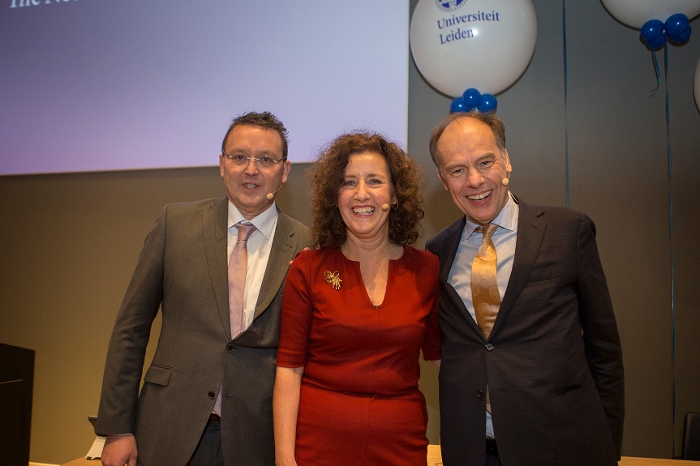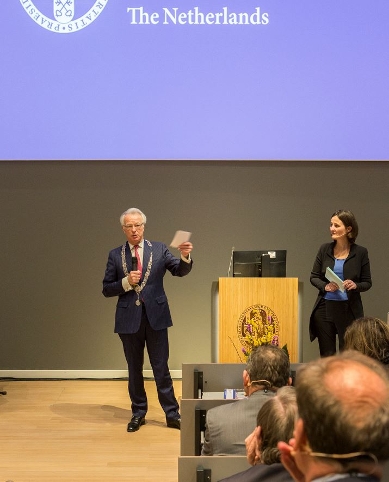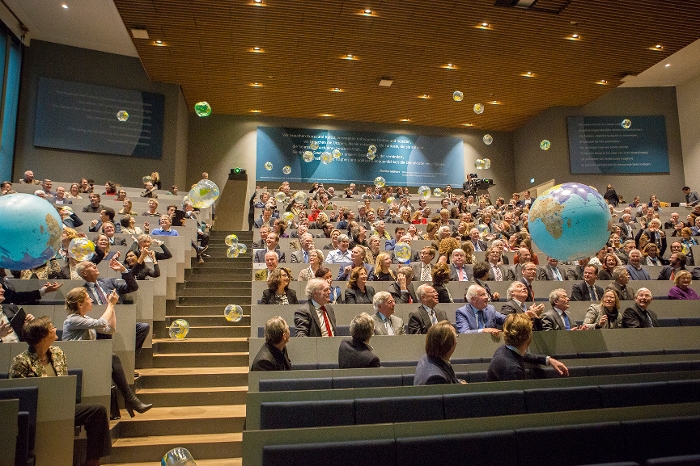
Wijnhaven: where you can get to know the world
On 10 February Leiden University celebrated the official opening of Wijnhaven, the University's newest premises in The Hague. Everyone present emphasised the added value of a modern location in the heart of the city.
Wijnhaven is one of the three locations that make up Leiden University's campus in The Hague. Situated among the ministries and close to Central Station, the building is an ideal base for students and researchers. In the coming years Wijnhaven will evolve into an academic hub for some 4,500 students.
Big-city issues
‘Leiden University has been spread over two cities for some years now,' said Rector Magnificus Carel Stolker in his opeing speech. 'The location in The Hague has a lot to offer students and researchers. It is the international city of peace, justice and security. In The Hague we have the centre of parliament, and the national and international courts of justice. These organisations are enormously interesting for our political scientists, public administration specialists and lawyers. The Hague is also an excellent base for studying big-city issues.'

14,000 square metres
The Wijnhaven building covers 14,000 square metres of teaching and research facilities and offers more than 630 study places, 280 quiet workplaces, 140 study places with computers, a library, an information desk, a meeting place for study associations and working places for 250 members of staff. There are five lecture halls (a mix of large and small) and 21 smaller classrooms with flexible walls. The first floor is home to the Future Lab of the Centre for Innovation.
Interaction between university and city
Wijnhaven is the new base for Governance and Global Affairs, but the University's other six faculties will also be developing activities here. All the faculties gave a brief pecha-kucha presentation during the opening, highlighting the interaction between the University and the city. Mattijs Numans, for example, talked about the new general practitioner programme offered in The Hague by LUMC, Sjoerd Louwaars presented information on the Changemakers Lab of the Centre for Innovation, and Arno Knobbe gave details of the Master in ICT in Business that will move to The Hague later this year.
Sarita Koendjbiharie explained how students of International Studies devise solutions for projects run by such diverse organisations and companies as the World Food Programme, Samsung and the Ministry of Foreign Affairs. Next, Roos van Oosten (Archaeology), Eric de Brabandere (Law) en Daniel Thomas (Social Sciences) took the floor.

Mayor's challenge
That LeidenUniversity can contribute to resolving scietal problems was clear from the Mayor's Challenge. Jozias van Aartsen, Mayor of The Hague, put a current government issue to teams of political scientists and lawyers. His question was: should and can a monitoring agency be set up for the Rotterdam-The Hague area, and can such an agency be elected on the basis of a constituency electoral system?
Pros and cons
Scientists and students showed that such a plan has both pros and cons. From a legal viewpoint, such a body is both possible and obvious, and if enough attention is paid to trust, consensus and accountability, it will probably reduce the division between people and government. 'But a constituency system goes against the consensus culture of Dutch politics,' commented Joost Westerweel, a PhD candidate of law. 'But we also have to look at the question of whether a metropolitan area isn't an ad hoc solution for a structural problem in the administrative structure of the Netherlands. 'Since the decentralisations of 2015, we are seeing more and more of these kinds of shared arrangements. The traditional arrangement of municipalities, provinces and state seem not to be adequate any more.'

Continuing innovation
Architect Leon Thier talked about how his team set about meeting the wishes of the University. By playing with transparency, a diverse array of workplaces and a view of the surroundings, Wijnhaven has all the attributes to become a meeting place where students and staff can get to know one another. And it is also a building where the door is open for organisations and businesses in the direct neighbourhood. 'That was my dream,' said Jouke de Vries, who many years ago was one of the instigators of the campus development in The Hague. 'An open university meeting between diverse groups is the key focus.' That meeting is important, alderman Ingrid van Engelshoven continued. 'We will only continue to be the city of peace and justice if we continue to innovate. And to do that, we need an open university.'
Get to know the world
To mark the opening, Carel Stolker, Ingrid van Engelshoven and Jouke de Vries each launched a large world globe into the air, followed by 250 smaller globes launched from the stately stairs in the hall. The gesture mirrored the motto of Leiden University: Here, you can get to know the world!'
Image: Nicole Romijn Fotografie
